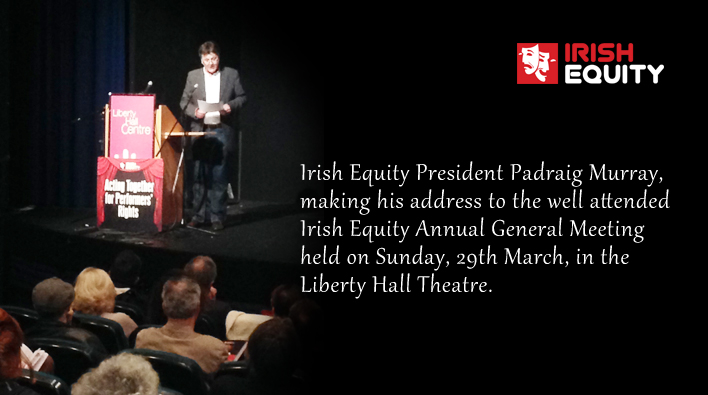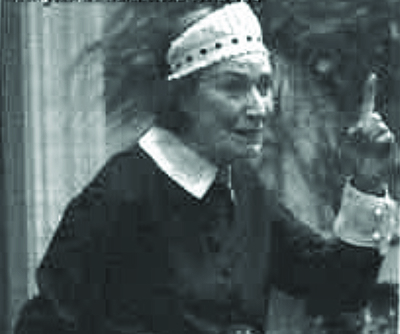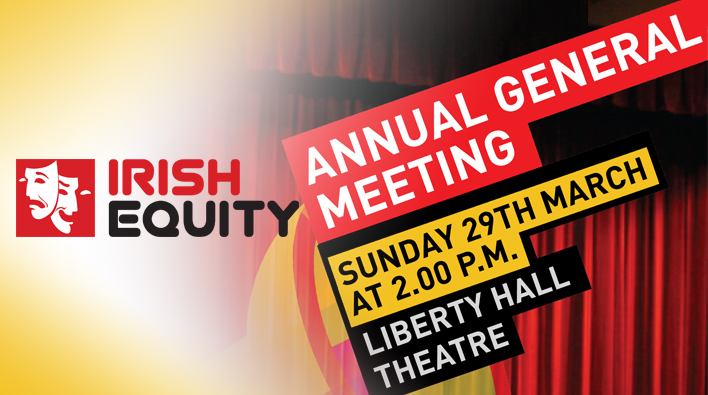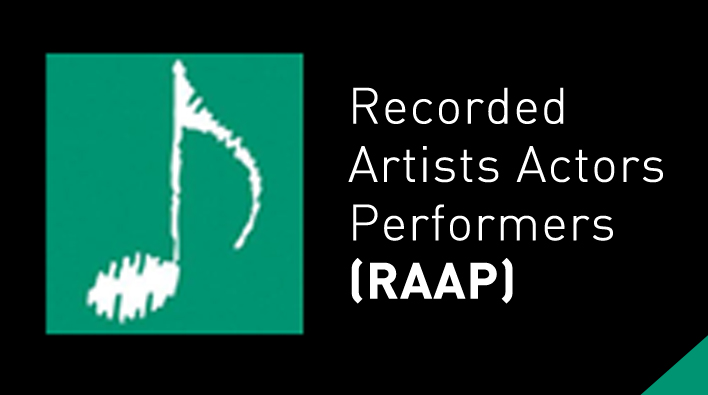Irish Equity Congratulates Stephen Rea on winning his BAFTA TV award for best supporting actor for his role in the popular British political spy thriller series [Read more…]
Joyce Campion – 1923-2014
Joyce Elaine Campion was born in Ireland in 1923 into a loving family. Her father was a clergyman who fell in love with her mother when he heard her sing beautifully. Joyce was born on her mother’s birthday and was soon joined by her brother and best friend, Brian (later, also a clergyman), with whom she got up to countless escapades, often fondly recounted.
She attended Alexandra College where, accordingly to her diary at age 11, she adored riding (Prince and Quicksilver were her favourite horses), played hockey, appeared in The Pied Piper and was frequently disciplined for talking too much.
Joyce fell in love with the theatre and it fell in love with her. She began her professional life in Ireland and England but spent most of it in Canada and occasionally the U.S. No ill, no misfortune could overwhelm if ‘Doctor Theatre’ was present in her life. Indeed, after suffering a devastating fall during a rehearsal for a play I was directing in 1995, Joyce’s determination to return to her beloved profession not only resulted in her rejoining the production later in the season but led to many more years of delightful performances. As her director and close friend, I was deeply distressed by her injury and remain eternally grateful for her recovery. We were all thrilled to see her subsequent triumphs – amoung them her literally scent-stealing maid Saunders in Fallen Angels and her miraculously appropriate final role, Anfisa, in Three Sisters.
Joyce never retired, regarding herself as an actor to the end. Though her last years were very difficult, she always found comfort in talking about the theatre, reciting her beloved Yeates and amusing her friends with the comic poem ‘If I Were a Lady’. And there were many friends – deservedly so. All of us miss her and will livingly remember her great generosity, her fierce loyalty, her irreverent wit and her joy in being a working actor.
by Marti Maraden
Fair Internet for Performers
Make the Internet Fair for Performers: Sign the petition: Performers bring life and soul to artistic works. Without them, Europe would not enjoy the vibrant cultural scene it does today and the creative content sector, which makes a vital contribution to Europe’s economy, would simply not exist. However, performers are still not properly rewarded when their performances are exploited on digital media. SIGN THE PETITION TODAY
Irish Equity AGM
 Irish Equity President Padraig Murray, making his address to the well attended Irish Equity Annual General Meeting held on Sunday, 29th March, in the Liberty Hall Theatre. In his address, Murray outlined the work of the union to date and appealed for a unity of purpose and direction from the membership. His call was well received by the members who voted to set aside their previous motion from 2012 to leave SIPTU in favour of Equity UK. This decision was taken by the membership in conjunction with a number of strong policy motions to drive Irish Equity forward along with a commitment to continue to build on the collegiate relationship that has been established with Equity UK and to continue with the work of the Ireland/UK Action Group.
Irish Equity President Padraig Murray, making his address to the well attended Irish Equity Annual General Meeting held on Sunday, 29th March, in the Liberty Hall Theatre. In his address, Murray outlined the work of the union to date and appealed for a unity of purpose and direction from the membership. His call was well received by the members who voted to set aside their previous motion from 2012 to leave SIPTU in favour of Equity UK. This decision was taken by the membership in conjunction with a number of strong policy motions to drive Irish Equity forward along with a commitment to continue to build on the collegiate relationship that has been established with Equity UK and to continue with the work of the Ireland/UK Action Group.
FIA Live Performance Conference
Second World Live Performance Conference: A landmark event for the International Federation of Actors to take place in Dublin in June. For the second time in its history, the International Federation of Actors – global federation of performers’ trade unions, guilds and professional associations founded in 1952 – organises a World Live Performance Conference. This will be a landmark event for the organisation and its some 90 members. Hosted by FIA’s members in Ireland and United Kingdom – Irish Equity and Equity – in Dublin, the event will gather some 200 performers, union representatives and industry representatives from around the world with the aim of discussing challenges, trends and best practices in the live performance sector. From June 4th to June 6th 2015, almost 50 speakers from different backgrounds and countries – including President Michael D. Higgins – will take the floor to defend performers and their role in society. READ MORE
Call out for cast members of RTE’s 1966 Drama Series “Insurrection’
RTÉ would like to get in touch with cast members who appeared in the 1966 series Insurrection written by Hugh Leonard. In the case of deceased actors, their families are invited to contact us. Phone Etain on 01 2083119 or email Etain.Ryan@rte.ie
Recorded Artists Actors Performers (RAAP)
Following the introduction of the Copyright Act on 1st January 2001, RAAP was set up to distribute performance royalties to artists (main artists and session musicians). You are entitled to a payment when a sound recording to which you have contributed is publicly broadcast in Ireland and around the world. Our organisation was officially launched on 15th February 2001 and is run by performers for performers. To date, we have collected and distributed performance royalties to the tune of €50 million.
The performance right exists throughout Europe and in almost every other country in the world. RAAP has engaged in collecting this income for our members through international reciprocal agreements entered into under EU and WIPO directives.
RAAP continues to lobby Government for legislative change as we take seriously our role in protecting the property rights of you, our members. We are a founding member of IMIR, the Irish Music Intellectual Rights group, along with our colleagues IMRO and PPI, collectively. We lobby Government and the European Commission on issues that impact on the welfare of our members and the Irish music industry.
RAAP has now begun to claim audio-visual rights on behalf of Irish actors.























